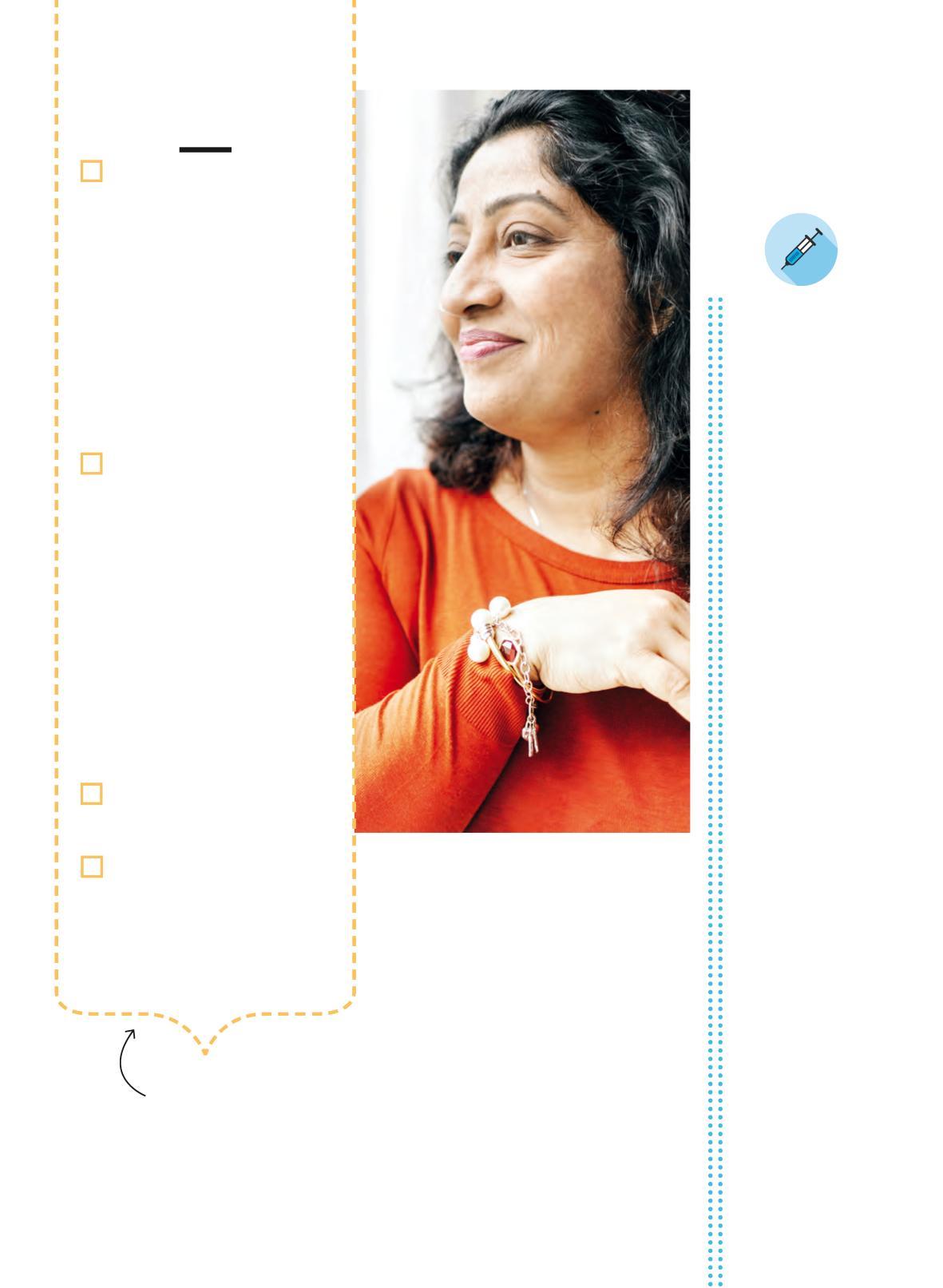
8 minute read
HOW TO BE HEALTHY AT EVERY AGE
HEALTH&FITNESS body talk healthy HOW TO BE
Our decade-by-decade checklists cover the essential medical tests you need—and why they’re important.
Advertisement
TEXT GRACE TOBY
AT EVERY AGE
By 2036, the life expectancy for Canadian women is projected to rise from 83 to 87 years, and from age 79 to 84 for men. With this extended lease on life, plus ongoing medical advances and a better understanding of our personal health, the future is looking bright.
Since an annual checkup with a family doctor is not always required, ensure that you understand your medical history, communicate health concerns to your doctor and stay on top of your medical screenings. Tailoring many of these preventive measures to your personal health regimen can go a long way toward thwarting potential illnesses and taking charge of your overall well-being.
30s Maintain established healthy habits, such as eating well and exercising, to set yourself up for success in later years. In addition, talk to your family members to find out if there are any hereditary issues you should discuss with your physician. Also be aware the average age at which Canadian women are having babies has increased over time to 30.2 years. “If you’re thinking about getting pregnant, prepare by taking a prenatal vitamin with folic acid, quitting smoking and alcohol, and becoming physically active,” says Dr. Karen Fleming, interim chief in the department of family and community medicine at Toronto’s Sunnybrook Health Sciences Centre and assistant professor in the department of family and community medicine at the University of Toronto.
CHECKLIST FOR YOUR 30s
PAP TEST If you’re not at high risk for cervical cancer, book a Pap smear every two to three years, depending on your provincial guidelines. It’s an effective way to check for cervical cancer for women aged 25 to 69, says the Canadian Task Force on Preventive Health Care. A Pap test can also detect human papillomavirus (HPV), a group of more than 100 different types of viruses. Some provinces use HPV tests to follow up abnormal Pap results as part of their cervical cancer screening programs. HPV testing is most effective for women aged 30 and older.
CHECKLIST FOR YOUR 40s
BLOOD-PRESSURE TEST Heart & Stroke recommends getting your blood pressure checked by a health-care provider once a year. High blood pressure is the number one risk factor for stroke and a major risk factor for heart disease. A lowrisk blood-pressure reading is less than 120/80. Your doctor will confirm a diagnosis of high blood pressure when either the top number (systolic) or the bottom number (diastolic) stays high over a period of time.

BLOOD-GLUCOSE TEST The number of diagnosed cases of diabetes and the prevalence of this disease are increasing for women and men. This blood test screens for Type 1 and Type 2 diabetes. Diabetes Canada recommends that women have this test at age 40 and then every three years after that. If you’re considered high risk, the test should be done earlier or more frequently. (A risk calculator, using indicators such as body mass index and ethnic background, will help determine your likelihood; find one at diabetestest.ca.) HEARING Speak with your doctor about having your hearing screened once in this decade. EYE EXAM Even if you haven’t noticed vision problems, the Canadian Ophthalmological Society suggests scheduling an eye exam every five years during this decade. The exam will also look for signs of glaucoma, which can start in your 40s. Did you know that strokes kill more women than men in Canada? “In our 40s, unique risk factors for cardiovascular disease impact screening. Having high blood pressure during pregnancy, early menopause and chest radiation for breast and other cancers would lead to additional screenings,” says Dr. Fleming. 40s During this busy and transitional decade, some women are still able to get pregnant while others may be entering perimenopause (the stage before meno-Along with a Pap test, you might pause), which can begin up to 10 years benefit from beginning these before a woman stops menstruating. medical screenings in your 40s. Immunizations INFLUENZA (FLU) Recommended annually for all adults.
PNEUMOCOCCAL This vaccine guards against pneumococcal disease, an infection that can result in pneumonia, ear and sinus infections and meningitis. Adults over age 64, who aren’t at high risk, should get one dose; adults aged 18 to 65 only need it if they have specific risk factors.
SHINGLES (HERPES ZOSTER) The vaccine is recommended for people aged 60 and older, although anyone over 50 can get it.
HPV (HUMAN PAPILLOMAVIRUS) If you haven’t received the HPV vaccination, it’s recommended for girls and women between the ages of nine and 45.
MMR (MEASLES, MUMPS AND RUBELLA) Those born after 1969 who haven’t had the vaccine should speak to their doctor about getting it.
TDAP (TETANUS, DIPHTHERIA AND PERTUSSIS) Adults should receive a booster every 10 years.
50s Beyond physical changes, this period can come with additional challenges, from aging parents to demands from older children, all competing for your attention. “Women are often not the best at putting themselves first, but good health is key—otherwise, you’re no help to anyone,” says Dr. Fleming. “Exercising your body and your brain is important for maintaining lean muscle mass, strength, cognitive function and balance.” By this time, you’ve probably experienced a few episodes of night sweats; if menopause hasn’t kicked in yet, expect it to start soon. The average age of menopause for Canadian women is 52.

Continue screenings as recommended in your 40s, and add the following. Note the more frequent eye exams.
CHECKLIST FOR YOUR 50s
MAMMOGRAM If you’re between the ages of 50 and 74 and not at high risk for breast cancer, book a mammogram every two years. If you’re at high risk due to family history or gene mutations (BRCA1 or BRCA2), a personal history of breast cancer or prior chestwall radiation, you may need earlier or extra screenings.
CHOLESTEROL Worried about developing high cholesterol (a fat found in the bloodstream)? Canadian guidelines recommend that women who are over 50 and at low risk, or those who are postmenopausal, have their cholesterol tested every one to three years. Here’s some good news: High blood cholesterol is one of the major controllable risk factors for coronary heart disease, heart attack and stroke.
COLORECTAL CANCER SCREENING The Canadian Cancer Society recommends people between the ages of 50 and 74 who are not at high risk for colorectal cancer have a fecal occult blood test, which checks for small amounts of blood in the stool, every two years. If the fecal test is positive, the society recommends a flexible sigmoidoscopy. “For those with no risk factors, a fecal occult blood test that can be done at home and mailed in is the way to go; if you have symptoms or a parent with colon cancer, then you should go straight to a colonoscopy,” says Dr. Fleming.
HEARING Speak with your doctor about having your hearing screened once in this decade.
EYE EXAM Starting at age 56, book more frequent eye exams—at least every three years, and more often if you’re having vision problems.
60s “It’s increasingly common to lose close family members and friends in this and beyond decade. Many individuals may feel isolated, but keeping busy and maintaining an active social life is important at this time,” says Dr. Fleming. Osteoporosis (porous bones) can become a serious health concern in your golden years. “Bone health is vital at this stage. Doing weight-bearing exercises and getting enough calcium and vitamin D all go a long way,” says Dr. Fleming. In the 65-plus group, the number of deaths is largest, with cancer and heart disease accounting for nearly half of fatalities.

CHECKLIST FOR YOUR 60s+
BLOOD-PRESSURE TEST During these senior years, the prevalence of high blood pressure increases in women versus men. Continue to have your blood pressure checked by a health-care provider once a year.
BONE MINERAL DENSITY SCAN All women over 65 should get a bonedensity test to check for osteoporosis, recommends Osteoporosis Canada. Start earlier, between the ages of 50 and 64, if you have risk factors, such as conditions that contribute to bone loss, like rheumatoid arthritis, or medications that can affect bone health. After your first test, the frequency depends on your risk for fractures. (Provincial regulations vary for age eligibility.) Along with testing for density, the scan looks at the quality of the bones and the mineral content. If the bones are weak, there’s an increased risk of fractures. It’s a painless X-ray, and it’s relatively quick, so you’ll be out the door in less than 20 minutes.
HEARING It’s estimated that more than 30 percent of adults over 65 have some type of hearing loss, so consider having your hearing tested by an audiologist at age 60 to set a baseline, then ask your doctor about screening your hearing at three-year intervals.
EYE EXAM If you’re over 65, even though you might notice no vision problems, consider booking an eye exam every two years; the examination can detect eye diseases such as cataracts and glaucoma, which are more prevalent at this age.
Continue screenings as recommended in your 40s and 50s, and add the bonedensity scan. You may be able to discontinue Pap tests after age 69; beyond 75, colorectal cancer screenings are no longer recommended by the Canadian Task Force on Preventive Health Care.
Versatile steel blue acts as a crisp neutral in this smart striped chair fabric.
colour of the month STEEL BLUE
Boasting a hint of blue, this almostgrey is suitable for practically any setting. The attractive cool shade serves as a fresh neutral when paired with a more saturated blue, as in these nauticalchic striped dining chairs, but complement it with a warm tone and you’ll see its full calming effect take hold.
& garden home











